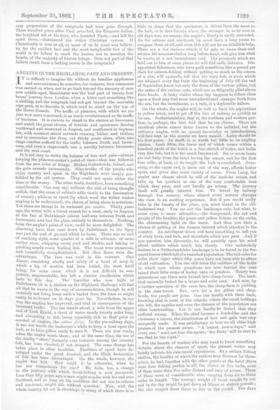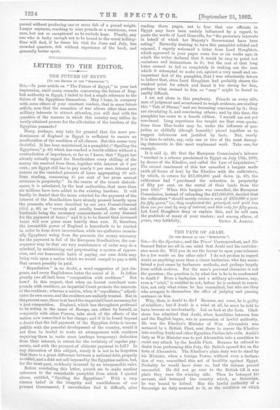ANGLING IN THE HIGHLANDS, PAST AND PRESENT.
IT is difficult to imagine life without its familiar appliances and conveniences; to conceive, for instance, how commerce was carried on when, not to go back beyond the memory of men now middle-aged, Manchester was the best part of twenty-four hours' journey from London, when a letter cost something like a shilling, and the telegraph had not got beyond the moveable sign-post, so to describe it, which used to stand on the top of the Horse Guards. The traffic of pleasure, with which we are just now more concerned, is as much revolutionised as the traffic -of business. It is curious to stand in the station at Inverness, and watch the great stream of tourists and .sportsmen Rowing northward and westward in August, and. southward in Septem- ber, with constant minor currents running hither and thither, -and to remember the time, not thirty years since, when two stage-coaches sufficed for the traffic between Perth and Inver- ness, and even a stage-coach was a novelty between Inverness and the west coast.
It is not easy to strike the balance of loss and gain—always keeping the pleasure-seeker's point of view—that has followed from the new Order of things. Reckon it absolutely, indeed, and the gain exceeds enormously. Nine-tenths of the people who -enjoy scenery and sport in the Highlands were simply pro- hibited by the old system. They could not spare either the time or the money. The other tenth, doubtless, loses something considerable. One may say, without the risk of being thought -selfish, that the sense of solitude adds vastly to the fascination of scenery ; while as to sport (by which word the writer wishes .angling to be understood), the charm of being alone is notorious. Yet there are things to be reckoned per contra. Thirty years ago, the writer with a friend stayed for a week, early in August, at the Inn of Delwhinnie (about half-way between Perth and Inverness), and had the place entirely to themselves. Nothing, from the angler's point of view, could. be more delightful. The charming burn that rims down by Dalwhinnie to the Spey was just the sort of ground which he loves. There was no risk of catching sight, some quarter of a mile in advance, of some earlier riser, whipping every pool and stickle, and taking or pricking nearly every feeding fish. The trout were numerous, and, beautifully unsophisticated. But then there were dis- advantages. The fare was rude in the extreme. One dinner; consisting wholly and solely of a bowl of soup in which a leg of mutton had. been boiled, the meat itself being, for some cause which it is not difficult to con- jecture, unpresentable, has left a sinister recollection which lasts to this day. The traveller who now halts at Dalwhinnie (it is a station on the Highland. Railway) will find all that he wants in the way of accommodation, though he will certainly not bring home such a basket from the burn as might safely be reckoned on in days gone by. Nevertheless, in one way the angling has improved, and that in consequence of the increased. traffic. The inn stands about a mile from the upper end of Loch Erieht, a sheet of water nearly twenty miles long, and abounding in fish, being especially rich in that' prize BO 'coveted of anglers, the salmo ferox. In the pre-railway days, it was not worth the innkeeper's while to keep a boat upon the loch, or to have gillies ready to man it. These are now ready, when the angler wants them; and. at the same time, the use of' the deadly "otter," formerly very common among the country folk, has been checked, if not stopped. The same change has taken place iu other localities. Facilities of sport have de- yeloped under the great demand, and the illicit destruction of fish has been discouraged. On the whole, however, the angler has lost. How could it be otherwise, when he has ten competitors for one P He feels, too, a change in the jealousy with which trout-fishing is now preserved. Less than fifty years ago, a man might wander with his rod over Scotland, and. as long as his ambition did. not rise to salmon and. sea-trout, might fish without question. Now, with the whole country let out in shootings, in many of which there is so little to shoot that the sportsman is driven from the moor to the loch, or in deer-forests, where the stranger is, as he ever in old days was, an enemy, the angler's liberty is sorely restricted. AS for salmon and. sea-trout, he must have a long purse to compass them at all, and even this will not be an infallible help. There are a few stations which, if he gets to know them and. secures his accommodation long before-hand, will give him what he wants, at a not immoderate cost. The prospects which are held out to him at some places he will find sadly delusive. Dis- appointed fishermen, who have paid. something like a pound per diem for salmon-fishing, without getting so much as the return of a rise, will cynically tell that the wary fish, in pools which are whipped every day from the beginning of July till the end of September, know not only the dress of the various gillies, but the make of the various rods, which are so diligently plied above their heads. A lucky visitor whose day happens to follow close upon a flood may find home unsophisticated. stranger fresh from the sea, but the investment, as a rule, is a deplorable failure.
On the whole, the angler will do well to limit his aspirations to yellow trout, and to get off the line of railway as quickly as he can. Sutherlandshire, that is, the northern and western por- tion, is, perhaps, the best find that he can choose. There are excellent places nearer home known to the initiated, but the ordinary angler, with no special knowledge or introductions, will fare best in the county we have named. Lairg should. be his first point. In itself, it is worth but little as an angling station. Loch Shin, the lower end of which comes within a hundred yards of the hotel, is a fine stretch of water, and holds very fine fish, but it is too much frepiented. Six or seven boats are out daily from the hotel during the season, and for the first four miles, at least, of its length the loch is overfished. Over- scaig, at the upper end, is more out of the way, affords better sport, and gives also more variety of scene. From Lairg, the angler may choose which he will of the mail-car routes, and take up his quarters at one of the very comfortable inns which they pass, and can hardly go wrong. The journey itself will greatly interest him. To travel by railway through fine scenery, where almost every minute changes the view, is an exciting experience. But if you would really take in the beauty of the place, you must travel in the old- fashioned way. You see not the landscape only, but what, to
seine oyes, is more attractive,—the foreground, the red and purple of the heather, the green and yellow lichens on the rocks, the shimmering light on the water. And then you have a chance of getting at the human interest which attaches to the country. An intelligent driver will have something to tell you
of every burn, and loch, and mountain which you pass. And if you question him discreetly, he will possibly open his mind. about matters which touch him closely. One melancholy feature in a Sutherlandshire landscape is to be found in the fre- quent traces which toll of a vanished population. The hill-sides for miles show signs which fifty years have not been able to efface of old cultivation. You can still trace the outlines of the fields in which men whose grandsons are now beyond the seas raised their little crops of barley, oats, or potatoes. Nearly two generations ago these were turned into sheep-farms. The land- lord naturally looked for a larger and safer rent. And now, by a further operation of the same law, the sheep-farm is yielding to the deer-forest. But, save for 'a few gillies and. shep- herds, the people are gone. One can hardly wish them back, knowing that in some of the islands, where the small holdings are left, the squalor and even the distress of the population are often heartrending. Yet it can hardly be denied. that they suffered. wrong. When the chief became a freeholder and the clansman a tenant, the distribution of loss and gain was very unequally made. It was satisfactory to hear on all sides high praises of the present owner. "A tenant, now-a-clays," said every one, "need not fear the agent ; the Duke' will be sure to see that he has right."
For the benefit of readers who may want to know something definite about the chances of sport, the present writer may briefly indicate his own recent experiences. At a certain fishing station, the locality of which the curious may discover for them- selves, he had, together with the other guests at the hotel (there were four fishing parties in all) the choice of five lochs, none of them more than five miles distant and easy of access. Three of these were of considerable size, ranging from six to three miles in length. The average weight of trout caught by one rod in the day might be put down at fifteen or sixteen pounds ; the size ranged front three to five to the pound. Few days passed without producing one or more fish of a pound weight. Larger captures, reaching to nine pounds as a maximum, were rare, but not so exceptional as to exclude hope. Finally, any one who is lucky enough not to be bound to the usual holiday- time will find, if he times his visit for June and July, less crowded quarters, fish without experience of the hook, and generally better sport.































 Previous page
Previous page